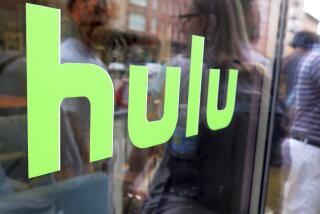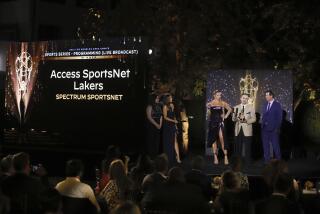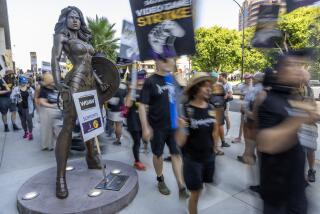THE 58TH ALL-STAR GAME : With Strike, It Isn’t Fun and Games : Labor Troubles Cast Their Shadow Over NBC’s Telecast
OAKLAND — As strike-troubled NBC set out to broadcast Tuesday’s All-Star baseball game, the people who were on the job and those who were picketing and passing out leaflets agreed on one thing: The coveted assignment of covering the mid-summer event was not much fun this year.
“My brother is carrying a picket sign today,” said Michael Weisman, the game’s executive producer. His brother, Harry, would have been operating the home-plate camera but for the strike by 2,800 members of the National Assn. of Broadcast Employees and Technicians.
“It’s sad. Some of the fun has been taken out of it,” Weisman said at the NBC broadcast compound inside the Oakland Coliseum, as two NABET pickets walked past.
“It definitely makes for bad feelings” to see inexperienced technicians working on an All-Star broadcast, said picketing cameraman Mike MeCartea of NABET Local 53 in Burbank.
“We had to pay our dues to get to the network level. . . . You’ve got to spend time in the minors before you get to the majors.”
NABET, which represents technicians, camera operators, tape editors and others, struck on June 29 over the issue of whether NBC can hire temporary day workers to do their jobs, a policy that the union believes threatens members’ job security. A federal mediator has ordered both sides to meet on July 20.
As the All-Star game approached, several labor disputes were settled, including threatened walkouts by the Directors Guild of America and unions representing concessionaires at the Oakland stadium. And while the NABET technicians opted against surrounding the stadium with pickets, a move that would have stopped other union workers from entering the stadium, labor problems still were evident at the 58th All-Star game.
A few concessionaires and security guards wore blue buttons in a show of support for the technicians. The union hired a small plane to circle the stadium with a banner reading, “Don’t come home to NBC until NABET can.” NBC had feared that players would not consent to interviews in a show of their support for the strikers. That turned out not to be the case, despite a request by Major League Players Assn. President Donald Fehr that players turn down NBC.
Weisman, meanwhile, had worried about what could have gone wrong during the broadcast. Several “cameramen” had operated cameras only once before Tuesday’s game, he said. To fill in for striking camera operators, NBC enlisted accountants, a lawyer and other office workers to operate some of the 13 cameras used at the game and to perform other tasks.
The network also filled 60 NABET positions with outside workers. The remaining 60 workers were NBC management personnel or those not covered by the NABET contract.
As it turned out, there were no flaws of note in the broadcast. A sound technician, who was hired for the game and asked not to be named, noted that many in the crew work regularly at Seattle Mariner games.
In the parking lot, about two dozen striking technicians milled around a trailer. Several said they noticed subtle differences in the broadcast.
“They’re just not as aggressive,” said Mike Higuera, noting that camera angles were wider than might be the case if regular crews were working. But even at that, the NABET members acknowledged that few people watching would notice. The strikers were left to pass out leaflets decrying NBC’s bargaining position.
“The baseball game was going to be played no matter what we did,” said Chuck Klein, a NABET technician who usually runs the instant replay machines and repairs the machine that produces the graphics.
The plan to “shut down the stadium” with pickets was dropped out of concern that the union would incur the wrath of baseball fans, and cast a pall over Oakland’s effort to improve its image. Oakland officials, wanting to avoid an embarrassing labor dispute, consented to allowing the union to place two pickets inside the stadium where NBC’s broadcast trailers were set up.
Weisman, meanwhile, expressed satisfaction afterward with the way the telecast had gone.
“It was a good telecast for what was basically an uneventful game,” he said.
More to Read
Go beyond the scoreboard
Get the latest on L.A.'s teams in the daily Sports Report newsletter.
You may occasionally receive promotional content from the Los Angeles Times.










